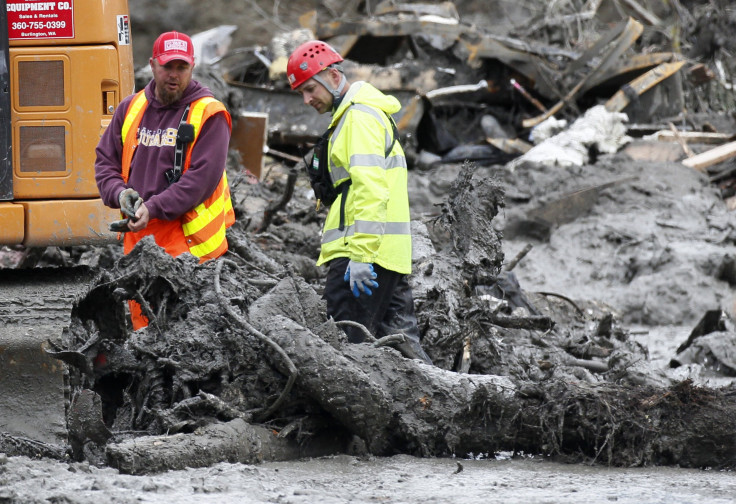Washington State Mudslide: Death Toll Hits 25 With 90 People Still Missing; Officials Say Some Bodies May Never Be Found

Authorities searching for victims of the mudslide in the state of Washington said Wednesday that the number of missing people had dropped to 90 while the death toll had risen to 25 people, adding that some victims’ remains may never be recovered.
Four days after a rain-soaked hillside collapsed near the small town of Oso in Snohomish County, about 60 miles north of Seattle, more than 200 emergency responders sifted through tons of mud and crushed houses for a fifth day with little hope of finding any survivors, as the debris reportedly covered an area of about 1 square mile. The massive mudslide occurred just before 11 a.m. on Saturday, and was at least 135 feet wide and 180 feet deep in size. And, officials have said that it destroyed a neighborhood of about 30 homes, blocked State Route 530, and jammed the north fork of the Stillaguamish River.
Jay Inslee, Washington state governor, said that he expected the death toll to rise significantly. "I don't think anyone can reach any other conclusion," he told CNN, when asked if more bodies would be found.
"It's been very sad that we have not been able to find anyone living now for probably 36 or 48 hours," he said. "The most discouraging thing is we were hopeful that we would find folks who might be protected by a car or a structure, but the force of this landslide just defies imagination."
According to reports, Brian McMahan, assistant fire chief of the community of Mukilteo, told a community meeting in nearby Darrington late on Wednesday evening that one additional body had been found earlier that day, bringing the known total to 25.
John Pennington, Snohomish County’s director of emergency management, reportedly said earlier Wednesday that authorities are looking into a list of 35 people who may or may not have been in the area at the time of last Saturday’s slide. Pennington had said on Tuesday that the operation was shifting from a rescue operation to a recovery mission.
"I never lose faith and a lot of the people in this community will never lose faith, but there's a realism element that's entered in," he told NBC's "Today" show on Tuesday, Reuters reported. "We have responded as well as we can, and we will continue to do that, but ... we are turning that very delicate corner in the recovery operation."
© Copyright IBTimes 2025. All rights reserved.





















